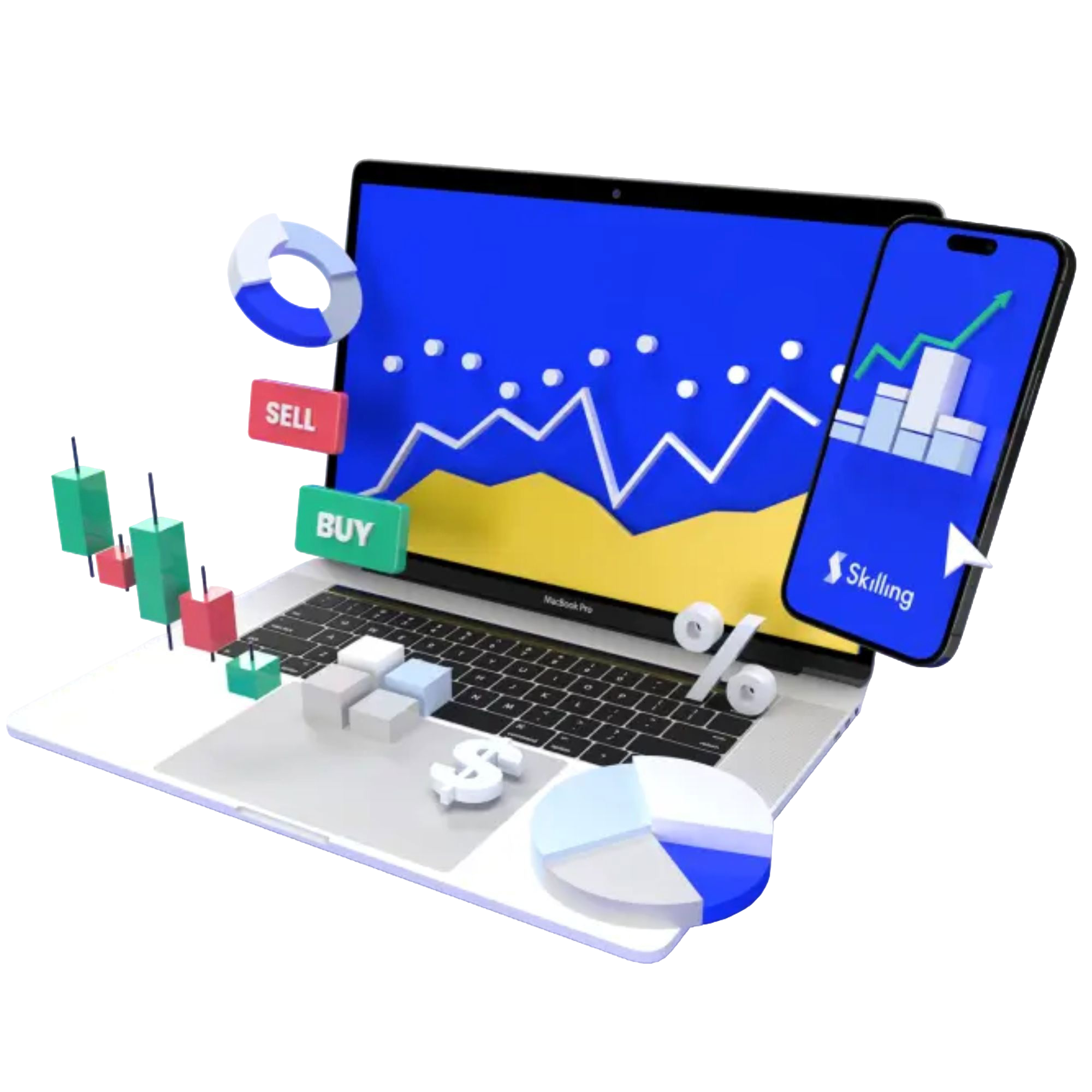The stock exchange is a cornerstone of the global financial system, facilitating the buying and selling of stocks and other securities. It plays a critical role in the economy by providing companies with access to capital and investors with opportunities to grow their wealth.
Practice with a Demo Account
Try our demo account and experience real market conditions.
71% of retail CFD accounts lose money.

At Skilling, we aim to simplify the stock exchange, explaining its functions, why companies go public, and how you can trade global stocks through CFDs. This guide will help you understand how the stock exchange works and how you can participate in this dynamic market.
What is a stock exchange?
A stock exchange is a regulated marketplace where securities such as stocks, bonds, and other financial instruments are bought and sold. It provides a platform for companies to raise capital by issuing shares to the public and for investors to trade these shares. Major stock exchanges include the New York Stock Exchange (NYSE), London Stock Exchange (LSE), and Tokyo Stock Exchange (TSE).
Key functions:
- Facilitating trade: Provides a platform for buying and selling securities.
- Price discovery: Helps determine the market value of securities through supply and demand.
- Liquidity: Ensures that securities can be quickly bought or sold.
- Regulation: Enforces rules to maintain fair and transparent trading.
Curious about Forex trading? Time to take action!
Use our free demo account to practise trading 70+ different Forex pairs without risking real cash
71% of retail CFD accounts lose money.

How the stock exchange works
The stock exchange operates through a system of buyers and sellers, brokers, and market makers. Here’s a simplified breakdown of how it works:
1. Listing of securities:
Companies go through an initial public offering (IPO) process to list their shares on the stock exchange. This involves issuing new shares to the public and raising capital.
2. Trading process:
- Order placement: Investors place orders to buy or sell shares through their brokers.
- Matching orders: The exchange's electronic trading system matches buy and sell orders based on price and availability.
- Execution: Once a match is found, the trade is executed, and the shares are transferred from the seller to the buyer.
3. Post-trade processing:
- Clearing: The exchange ensures that the buyer has the funds and the seller has the shares.
- Settlement: The actual transfer of funds and shares occurs, typically within two business days (T+2).
Why do companies go public on the stock exchange?
Going public offers several advantages for companies:
Raising capital: Companies can raise substantial funds by issuing shares to the public, which can be used for expansion, research and development, debt reduction, or other business activities.
Increased visibility: Being listed on a stock exchange enhances a company’s visibility and credibility, potentially attracting more investors, customers, and partners.
Liquidity for shareholders: Publicly traded shares provide liquidity, allowing shareholders to buy and sell shares easily.
Employee incentives: Public companies can offer stock options and shares as part of employee compensation packages, helping to attract and retain talent.
Stock Exchange vs. Broker
Understanding the difference between a stock exchange and a broker is important to know for traders and investors:
| Stock Exchange | Broker |
|---|---|
| Role: Provides the platform for trading securities. | Role: Acts as an intermediary between investors and the stock exchange. |
| Functions: Facilitates trade, price discovery, liquidity, and regulation. | Functions: Executes buy and sell orders on behalf of clients, provides investment advice, and offers various financial services. |
| Participants: Includes companies, investors, brokers, and market makers. | Types: Can be full-service brokers (offering personalized advice and services) or discount brokers (offering low-cost trading with minimal services). |
Trade global stocks CFDs online
Trading global stocks through Contracts for Difference (CFDs) offers flexibility and the potential for profit without owning the underlying asset. Here’s how to get started with Skilling:
Sign up: Create an account on the Skilling platform. The registration process is quick and user-friendly.
Verify your account: Complete the necessary verification steps, including providing identification and proof of address.
Deposit funds: Fund your trading account using your preferred payment method. Skilling supports various deposit options for your convenience.
Start trading: Access a wide range of global stocks and start trading CFDs. Use Skilling’s advanced tools and resources to analyze market trends and make informed decisions.
Monitor and adjust: Continuously monitor your trades and adjust your strategy as needed. Utilize stop-loss and take-profit orders to manage risk effectively.
Summary
The stock exchange is a vital component of the financial system, enabling the trading of securities and providing companies with access to capital. Understanding how the stock exchange works, why companies go public, and the differences between stock exchanges and brokers is essential for any trader or investor.
By trading global stocks CFDs online with Skilling, you can take advantage of market opportunities and manage your investments effectively.
FAQs
1. What is a stock exchange?
A stock exchange is a regulated marketplace where securities such as stocks and bonds are bought and sold.
2. How does the stock exchange work?
The stock exchange matches buy and sell orders through an electronic trading system, facilitating the transfer of securities between investors.
3. Why do companies go public on the stock exchange?
Companies go public to raise capital, increase visibility, provide liquidity for shareholders, and offer employee incentives.
4. What is the difference between a stock exchange and a broker?
A stock exchange provides the platform for trading securities, while a broker acts as an intermediary, executing trades on behalf of clients and offering investment services, but not advice. And remember, past performance does not guarantee or predict future performance.
5. How can I start trading global stocks CFDs online?
To start trading CFDs on global stocks or speculating on commodities such as cocoa prices, sign up with Skilling, verify your account, deposit funds, and use the platform’s tools to trade and monitor your investments.











